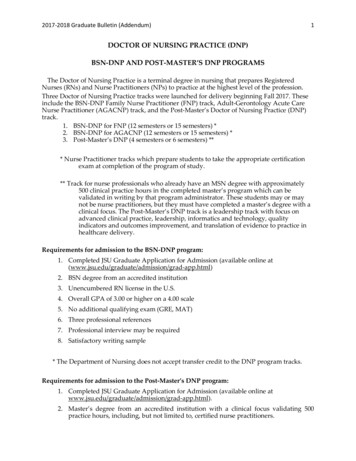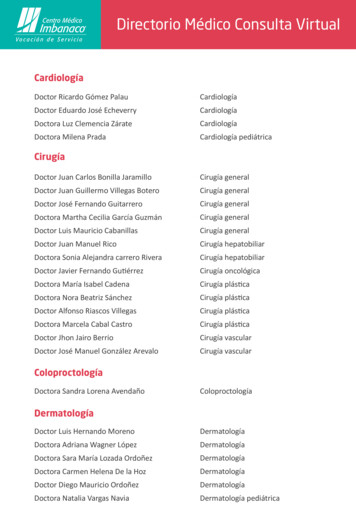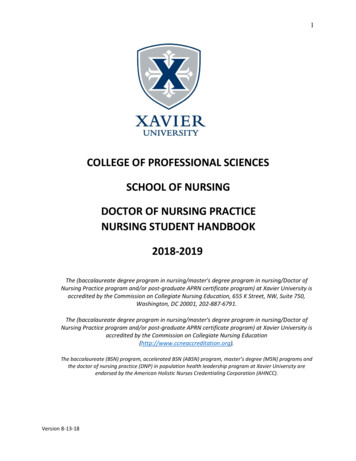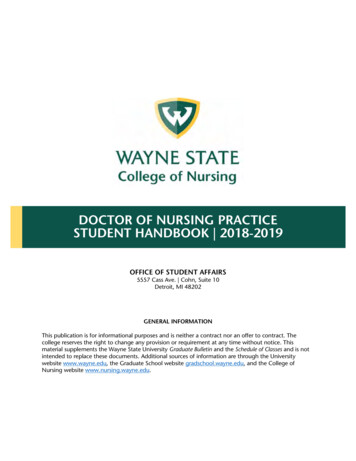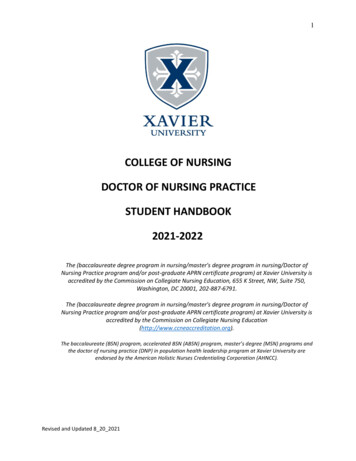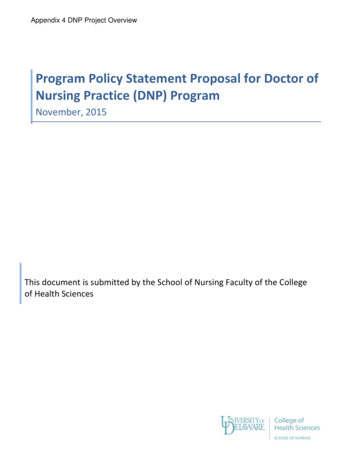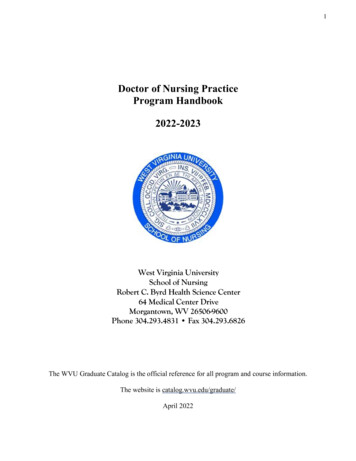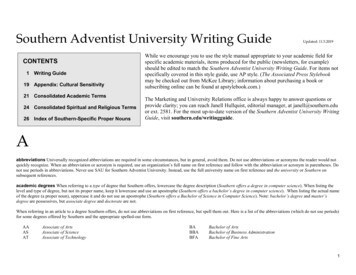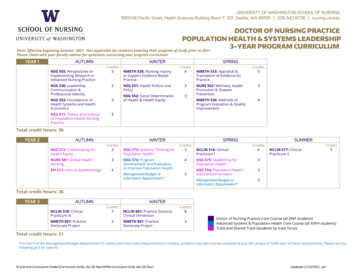
Transcription
UNIVERSITY OF WASHINGTON SCHOOL OF NURSING1959 NE Pacific Street, Health Sciences Building Room T-301, Seattle, WA 98195 206.543.8736 nursing.uw.eduDOCTOR OF NURSING PRACTICEPOPULATION HEALTH & SYSTEMS LEADERSHIP3-YEAR PROGRAM CURRICULUMNote: Effective beginning Autumn 2021. Not applicable for students entering their program of study prior to 2021.Please check with your faculty advisor for questions concerning your program curriculum.YEAR 1AUTUMNNSG 555: Perspectives onImplementing Research inAdvanced Nursing PracticeWINTERCredits3NSG 530: LeadershipCommunication &Professional Identity3NSG 553: Foundations ofHealth Systems and HealthEconomics3NSG 571: Theory and Scienceof Population Health NursingPractice3NMETH 535: Nursing Inquiryto Support Evidence-BasedPracticeSPRINGCredits4NSG 551: Health Politics andPolicy3NSG 552: Social Determinantsof Health & Health Equity3NMETH 533: Appraisal &Translation of Evidence forPracticeCredits5NURS 552: Wellness, HealthPromotion & DiseasePrevention3NMETH 536: Methods ofProgram Evaluation & QualityImprovement4Total credit hours: 36YEAR 2AUTUMNNSG 572: Collaborating forHealth EquityWINTERCredits3NURS 581: Global HealthNursing3EPI 511: Intro to Epidemiology4NSG 573: Systems Thinking forPopulation HealthSPRINGCredits3NSG 574: ProgramDevelopment and Evaluationto Improve Population Health4Management/Budget orInformatics Requirement*3NCLIN 516: ClinicalPracticum ISUMMERCredits4NSG 575: Leadership forPopulation Health3NSG 554: Population Healthand the Environment3Management/Budget orInformatics Requirement*3NCLIN 517: ClinicalPracticum IICredits5Total credit hours: 36YEAR 3AUTUMNNCLIN 518: ClinicalPracticum IIINMETH 801: PracticeDoctorate ProjectWINTERCredits73NCLIN 801: Practice DoctoralClinical ImmersionNMETH 801: PracticeDoctorate ProjectCredits83Doctor of Nursing Practice Core Course (all DNP students)Advanced Systems & Population Health Core Course (all ASPH students)Track and Shared Track (students by track focus)Total credit hours: 21*For EACH of the Management/Budget Requirement (3 credits) and Informatics Requirement (3 credits), students may take courses available at any UW campus to fulfill each of these requirements. Please see thefollowing grid for options.O:\Central Curriculum Folder\Curriculum Grids, AU 20 Start\PHN Curriculum Grid, Aut 20 StartUpdated 1/13/2021, am
INFORMATICS Course Options (Note that Winter and Spring options will fit best with the PHSL curriculum schedule)CodeCourse TitleNMETH523Project Management AndSystem Analysis ForHealth InformaticsIntroduction To ClinicalInformaticsNMETH527NURS 524Conceptual FoundationsFor Healthcare Systems:Organizational StructureAnd EffectivenessHIHIM 520Law, Policy, And Ethics InHealth InformationNMETH524Healthcare InformationSystems and theElectronic Health RecordsNMETH528ComputingFundamentals for HealthProfessionalsPublic Health andInformaticsHSERV509/ BIME533BIME 535Clinical Care andInformaticsBIME 554Biomedical InformationInteractions And DesignCourse DescriptionCreditsQuarterApplication of methods of inquiry to develop a scholarly proposal through faculty-guidedindividual composition. Students select the project topic and complete the conceptual phase ofproposal development to fulfill their project planOverview of the history, current efforts, and future challenges in designing, developing, andimplementing information and communication technologies for healthcare. Examines howthese technologies fulfill the Quadruple Aim: enhancing the patient experience, improvingpopulation health, reducing the overall cost of care, and improving the work life of health careproviders.Examines the healthcare delivery system and systems of care within it, including evolution andstructure of organized healthcare in the United States, key drivers of organizationaleffectiveness, components of care systems, and Innovations in care system design andadoption. Explores use of various types of information technology to monitor and increaseorganizational effectiveness.3Autumn3Autumn3AutumnExplores the laws, policies, and issues involved in oversight and management of health data andhealth information systems. Defines the legal health record and the requirements, role, anduses. Covers the legal and ethical framework, issues and concepts, and the role of e-discoveryon the emerging health data environment.Overview and analysis of healthcare informatics issues, including patient safety and InformationTechnology (IT), infrastructure, clinical systems, definitions and functions of EHR systems, ITleadership in healthcare organizations, informatics change management, including key userroles evaluating EHR and workflow changes.Survey of applied computing concepts, including computer algorithms, operating systems,networking, databases, digital privacy and security, applied programming principles to enhanceproductivity, and data science opportunities and pitfalls in healthcare.Introduction to the emerging field of public health informatics. Covers general public healthtopics as well as key public health informatics issues and applications. Evaluates a public healthinformation system. Prerequisite: either BIME 530 or permission of instructor. Offered: jointlywith BIME 533.Explores the ways in which information technology affect healthcare delivery system design anddelivery. Considers current and future research questions and trends as well as current andfuture application opportunities and challenges.Introduction to theoretical frameworks and research methodologies that underpin the study ofhuman-information interactions and the design of biomedical information systems to supportthem. Emphasis on understanding informational needs and specifications that drive the designof health information systems.3Winter3Winter3WinterCIPCTPROGRAM EMAILUWCIPCT@UW.EDU FOR ADDCODE3Winterapproval byinstructor3Spring3Spring
INFORMATICS Course Options (Note that Winter and Spring options will fit best with the PHSL curriculum schedule)BIME 570/LIS 528Health SciencesInformation Needs,Resources, AndEnvironmentHIHIM 556Healthcare Quality haracteristics of users of health sciences information; health professionals, researchers,consumers and patients; environments (academic health sciences centers, hospitals, clinics, andpublic libraries); evaluation of information resources in health care; types and uses of healthinformation management systems; policy issues, professional standards, education, andcertification. Offered jointly with LIS 528Explores the current healthcare environment related to healthcare safety issues. Examines anoverview of major health and safety challenges and responses; focusing on the impact of theissues in improving health and safety in healthcare and information resources needed.Current and emerging consumer-centric eHealth technologies. Theories and principles ofhealth, communication, information, cognitive processing, and human-technology interaction.Experts from multiple disciplines and patient/consumers lead seminar presentations anddiscussions on select topics. Addresses ethical implications of these tools, including M EMAILUWCIPCT@UW.EDU FOR ADDCODE
MANAGEMENT/BUDGET Course Options (Note that Winter and Spring options will fit best with the PHSL curriculum schedule)CodeBUS AN500Course TitleFinance AndAccountingHIHIM 508Health InformationManagement SystemsAnd LeadershipMGMT 500Management AndLeadershipMGMT 501Leading Teams AndOrganizationsLeading And ManagingHigh-PerformanceOrganizationMGMT 545PUBPOL509Managing People InPublic And NonprofitAgenciesPUBPOL522Financial ManagementAnd BudgetingPUBPOL531DevelopmentManagement AndGovernancePUBPOL550Managing NonprofitAnd PhilanthropicOrganizationsCourse DescriptionCreditsQuarterProvides a broad introduction to the use of financial information to make decisions within anorganization. Covers topics that are most useful to managers who are (or will be) in businessanalytics roles.Provides a high level framework of health informatics and health information managementpractice. Covers practice related systems with emphasis on enterprise information governance,patient record organization, content and structure, and associated enterprise business functionsand processes to provide foundation for understanding the practice.Behavioral aspects of management with emphasis on leadership, motivation, and decisionmaking. May include communication, conflict management, group dynamics, and organizationalchange.Offers a practical framework and empirically validated models and methods that can be used ininnovative ways to enhance human capital and its impact, including of course your own capital.Focuses on the nature and function of effective leadership in high-performance systems.Includes visionary and transformational leadership, decision-making and empowerment, powerand influence in organizations desiring flexibility and innovation, and leading organizationalchange. Places emphasis on leadership of emerging forms of organization such as learningorganizations, virtual organizations, and networks.Explore the fundamentals of managing people with a specific emphasis on managing people innonprofit and public agencies. Covers theoretical and practical aspects of management such as:learning how to motivate a team for results; understanding key aspects of human resource lawand practice; exploring how lean management can be utilized in nonprofit and governmentagencies; managing a diverse workforce, and managing in a union environment.An introduction to financial and management accounting, and an overview of public andnonprofit budgeting systems. Covers tools and techniques for budget analysis and the use offinancial information in managerial decision making.Addresses the connections linking governance systems, the management and implementation ofpublic policies, and policy and program outcomes, with focus on capacities and strategies of abroad array of actors engaged in international development. Covers management challengesfaced by government bureaucracies and civil society actors, the changing landscape ofdevelopment assistance, public sector reforms, and human rights in development context.Focuses on the roles and practices of nonprofit and philanthropic organizations. Provides anoverview of topics relevant to nonprofit and social sector organizations, including theoreticalfoundations, legal forms, governance and leadership, cross-sector relationships, revenuestreams and fundraising, and policy n4Autumn4Autumn4Autumn
MANAGEMENT/BUDGET Course Options (Note that Winter and Spring options will fit best with the PHSL curriculum schedule)SOC W 550B ECON510GH 522Strategic ProgramManagement AndChange Leadership InHuman ServicesMicroeconomics ForManagersProject Management InGlobal HealthPPM 514Organizations,Management, AndTheoryPUBPOL503Executive cePUBPOL523PUBPOL553Advanced Budgeting InThe Public SectorNonprofit FinancialManagementPUBPOL557Financial Modeling ForThe Public SectorSOC W 552Financial ManagementOf Human ServicesProgramsExamines tools and techniques required for leadership, program planning, implementation, andprogram change. Topics include strategic planning, logic modeling, agency-bound relations,work-group facilitation, and diversity-promoting management. Lecture, discussion, and exercises.Required for SSW administration concentrators; open to others with permission of instructor.In this course, students gain an understanding of how markets work, and learn optimal (profitmaximizing) strategies for managers.Covers the fundamentals of project management, including conducting needs assessments,creating planning and implementation documents, managing resources, transitioning projects,and monitoring and evaluating projects. Discusses practical tips, tools, and techniques for how toaddress unexpected challenges that inevitably arise in international and other low resourcesettings.Explores key theories of organizations and management employing perspectives from sociology,political science, economics, and public management. Theories are applied in the context ofprivate, nonprofit, and public sector organizations. The course builds on the requiredcourse PPM 504 Institutional Perspectives.Cultivate the practical skills required to lead within various operational contexts. Managerialstrategies for addressing problems in public, not-for-profit and business organizations will beexamined through case studies, general readings, class-exercises, presentations by practitioners,and self-reflection. Throughout this course, students will practice the core skills required for theirsuccess as future leaders.Addresses questions of organizational design, personnel, and operations management to equipstudents with skills to perform effectively in mission-driven organizations. Core topics includeorganizational design, inter-organizational networks, human resources and staff management,improving service delivery and production flows, measuring and managing for performance, andethical leadership.overs more advanced topics in governmental budgeting. Provides an overview of the functions,expenditures, and revenues of federal, state, and local governmentsProvides an understanding of the financial framework on nonprofit organizations. Focuses onthe financial principles of management of nonprofits, with an emphasis on financial reporting,strategic financial planning, managerial decision-making and budgeting.Covers financial modeling concepts at the core of public sector finance including: cash flow (orrevenue) forecasting and proforma financial statements, capital life-cycle cost analysis, portfoliovaluation and risk management, debt sizing, structure, and refinancing.Covers key financial management components of human service programs, includingdevelopment and use of business plans, budgets, and financial statements. Helps students todemonstrate an understanding of financial management through budget preparation, financialstatement analysis, new project cost projections, audits, and presentations using computerbased spreadsheets and presentation r4Winter4Winter4Winter3Winter
MANAGEMENT/BUDGET Course Options (Note that Winter and Spring options will fit best with the PHSL curriculum schedule)HSERV 572Planning, Advocacy AndLeadership SkillsHSERV 587Health PolicyEconomicsPUBPOL524Public Sector FinancingSOC W 551Human ResourceManagement In TheHuman ServicesSOC W 580Grant Writing And FundDevelopmentAn opportunity to master basic concepts, analytic tools, and skills for health program and policyplanning, advocacy, evaluation and leadership skills under close mentor-ship of faculty andteaching staff in an interdisciplinary and applied setting. Engages MPH and other graduatestudents with real-world public health problems, partners with local community healthorganizations, builds skills and competencies in a number of topics and processes.Applies economic theory to selected topics in healthcare, including information, risk andinsurance, industry organization, government regulation, and public health issues. Emphasizespolicy implications of these applications.Covers financial management in public agencies, with the primary focus on state and localgovernment.4Spring3SpringTheories and techniques for 1) designing human services workplaces that support employees'performance and well-being, and 2) managing diverse, satisfied, and high-performing humanservice staffs. Topics include job quality analyses; job descriptions; employee interviewing,supervision and performance evaluation; models of negotiation and conflict resolution; andstrategies for working with volunteers.Prepares students to participate and provide leadership in grant writing and fundraising forcommunity-based human services. Opportunity to practice skills required for developing asuccessful grant proposal and planning a successful fundraising program. Identify, cultivate, anddevelop sources of funding. Students assist in writing a complete grant proposal as final project.3Spring3SpringandWinter4SpringPUBPOL 522,or instructorpermission.instructorpermission.
3-YEAR PROGRAM CURRICULUM O:\Central Curriculum Folder\Curriculum Grids, AU 20 Start\PHN Curriculum Grid, Aut 20 Start Updated 1/13/2021, am . Doctor of Nursing Practice Core Course (all DNP students) Advanced Systems & Population Health Core Course (all ASPH students) Track and Shared Track (students by track focus) CreditsCredits NCLIN 518 .
